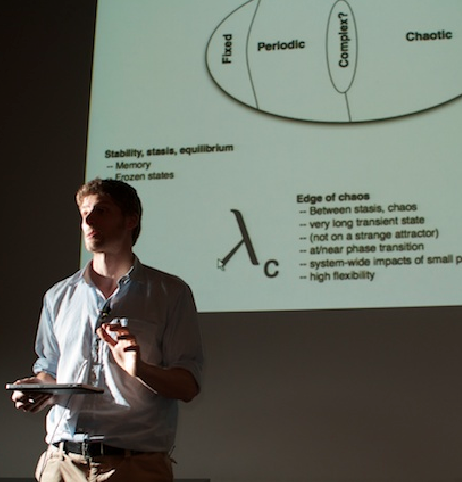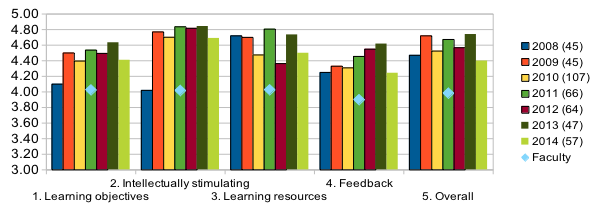Teaching
Awards
Monash Vice-Chancellor's Award for Teaching Excellence (2016) (.pdf)
Australian Learning & Teaching Council (ALTC) Citation for Outstanding Contributions to Student Learning (2011) (citation). ALTC-AwardStatement2011 (.pdf) Congratulations from the VC (.pdf)
Monash Vice-Chancellor's Citation for Outstanding Contributions to Student Learning (2010) VC-AwardStatement2010 (.pdf)
Monash Faculty Excellence in Teaching Award (2009) Dean-AwardStatement2009 (.pdf)
Australian School of Business (Faculty of BusEco at UNSW) Teaching Innovation Awards (2008) (jointly, with Judith Watson)
Misc
Research Presentation Skills Workshop
Simon's advice on putting together teaching and learning grants:
Simon was interviewed for case-studies in collaborative teaching:
Other
- Dean's Commendation for Outstanding Teaching (2010), Faculty of Business and Economics, Monash University.
Talks on Teaching and Learning
(.pdf.zip) Angus, S., "Blended Learning: a player's perspective", Department of Accounting and Finance Learning and Teaching Forum, 7 Dec 2011.
(.pdf.zip) Angus, S., and Newnham, A., Everyone needs a map: educational mapping of units, disciplines, faculties and universities, Department of Economics Teaching Week 2011 Research Seminar, 21 September, 2011.
(.pdf) Angus, S., Clouding around with an iPad, '2011 Accounting and Finance Cool Tools for Teaching and Learning', 10 Feb 2011, Caulfield Campus, Monash University).
(.pdf) Angus, S., Would the useful iPad Lecturing App please stand up?: Tablet PCs, iPads and other adventures at the bleeding edge, 'Australasian Tablets in Education Conference', 10 Dec 2010, Caulfield Campus, Monash University).
(.pdf) Angus, S., Teaching awards: a player's perspective, 'Business Education Research Network', 27 October 2010 (Innovative learning space, Monash, Caulfield)
(.pdf) Angus, S., Tablets in Economics: use and experiences, 'Monash Tablets in Education' Forum, 26 May 2010 (Monash Club, Clayton).
(.pdf) Angus, S., Technology and Innovations for Teaching Large Classes, Department of Economics -- 'Effective Teaching' Forum, 1 May 2009 Dept. Economics, Caulfield Campus.
Supervision
I have been fortunate to work with some outstanding students, please have a read of their work below. NB: If you would like to contact the author, or discuss the work, please email Simon (address at top of the page).
Honours
Simon's Honours Honour Role:
Dominic Zaun Eu Jones, 2016: The Topology of Knowledge --> RBA
Oscar Lane, 2016: Identifying Revealed Economic Resilience through Input-Output Network Analysis: A new lens on economic health --> Deloitte Access Economics
Penelope Mealy, 2012: Capturing realistic dynamics within an artificial model of technological progress: do neoclassical pricing assumptions matter? --> Deloitte Access Economics/Oxford U PhD program (Doyne Farmer)
Andrew Newnham, 2011 (Honours Research Project Prize 2011): The Bit-Economy: an artificial model of specialisation & open-ended technology discovery abstract/citation Read the paper published in ''Complexity'' Journal --> Frontier Economics
(.pdf) Rochwerger, J. (2010) How should government investments be made to improve the socio-economic status of remote Indigenous communities in Australia? Should the Australian Government consider a change with its existing policy?, Honours Thesis submitted October 2010, Department of Economics, Monash University.
(.pdf) Dutta, R. (2010) Analysing the Effectiveness of Service Providers in the Homelessness Sector, Honours Thesis submitted October 2010, Department of Economics, Monash University. (jointly supervised with Rebecca Valenzuela (<Rebecca DOT Valenzuela AT buseco DOT monash DOT edu DOT au>)
Masters
Georgie Stokol, 2017: The determinants of cultural similarity among the nations: the view from Google Trends
PhD
Completed PhD Students:
Klaus Ackermann (main): 'The Economics of Technology' (see Grants, and publications above). Completed 2016/17. --> Research-Felow, Center for Data Science and Public Policy, U Chicago (Rayid Ghani).
Simon's current PhD students:
Andrew Reilly (associate, ANU): 'The emergence of political ideation' (ANU).
Thinking of doing a PhD?
- I'm happy to hear from you. Please email me. Though you may want to read:
Units Taught
Current Teaching Responsibilities
(S1, 2009 -) ECC2800: Prosperity, Poverty & Sustainability (Handbook) PPS Unit Guide (2010) (.pdf)
A new unit (introduced S1, 2009) that deals with long-run growth, the determinants of poverty, poverty alleviation and the impact of climate change on developed and developing countries. It has no pre-requisites, so it is perfect for a non-BusEco student who is keen to get stuck into the big Economics issues shaping our times.
Previous
Monash 2010-2012
(S2, 2010 - 2012) ECC3860: Integrated Economic Modelling (Handbook) IEM Unit Guide (2010) (.pdf)
A new unit (introduced S2, 2010) that builds on the shorter six-week offering of ECC3855 (see below), teaching a Complex Systems perspective on the economy together with an agent-based modelling toolset. We deal head-on with the difficult modelling challenges of modern economics: the dual feedbacks from the 'macro' to the 'micro' and from the 'micro' to the 'macro'. The specific application example will be how to handle the economics of climate change, migration, conflict and growth.
Monash 2008
(S1, 2008) ECC5650: Advanced Micro Theory (Handbook)
- Post-graduate level micro -- proofs and propositions with sets.
(S1, 2008) ECC2810: Globalisation and Economic Systems (Handbook)
A critical look at the major organisational and ideological economic arrangements of the 20th C. including Stalinist and Leninist Russia, the Scandanavian welfare state, Japan's post-war boom, and of course, the contemporary market economy. For a taste, see The Commanding Heights documentary online.
(S2, 2008) ECC3855: Complex Systems & Agent-based Modelling (Pre-Honours topic)
A primer in complex systems and agent-based modelling, run for 6 weeks in the pre-honours unit. See the excellent student projects here: ECC3855 Project Exhibit
UNSW 2006-2007
- ECON1201: Quantitative Methods A
- An introductory maths unit focussing on Financial maths, Probability primer, Linear algebra (with an emphasis on using software), Linear programming, Calculus (up to constrained optimization in several variables).
With Judith Watson, we undertook a comprehensive review of 'QMA' including content, assessment and lecture delivery, some sampel fruit from this review process are given here:
The updated Course Outline (.pdf)]
The corresponding Example Slides (.pdf)
- ECONX: Game Theory and Business Strategy
- A Game Theory primer including: Normal and Extensive form games; Nash, SPNE solution concepts; Mixed strategies and solutions; Evolutionary games; Bargaining; and Duopoly solutions.
What's Game Theory? Try a primer article written for ECHO, the UNSW FCE students' society journal: Download (.pdf)
Unit and Teaching Evaluation scores
In the interests of full disclosure, I'm publishing here my teaching evaluations. The unit evaluations are available to students and staff of Monash, but the teaching evaluations (which are voluntary) are not. However, I feel it is good practice to allow students to know what they are getting. Like any teacher, I have some weaknesses in teaching and some strengths. I care a lot about my teaching, and aim to improve.
Note: Since there's now a lot of these links, I've summarised the Unit Evaluations across the years I've been at Monash for simplicity. The x-axis shows the questions that students are asked. The y-axis shows the median students give me, weighted by response rate across the various units and cohorts for a given year. I include the Faculty (BusEco) avg. median for comparison.
(Note on 2014: I introduced a completely new feedback and assessment tool to the ECC2800/APG4429 unit in S1 (a peer-review module for the pre- and major- essay assignments). Since little else was altered, I attribute the general drop in responses to this major change. The first iteration of any major innovation has teething problems! I'm thankful to the students of 2014 who helped me see what worked and didn't. I hope to improve the approach for 2015 and beyond.)
Evaluations
Monash University (2008-- )
ECC2800 (Prosperity, Poverty & Sustainability) (also coded ENV4060 and ENV5060 (2010), and APG4429 and APG5429 (2011-))
2014, S1
ECC2800 students: Unit (.pdf) Teaching (.pdf)
APG4429 students: Unit (.pdf) Teaching (.pdf)
2013, S1
ECC2800 students: Unit (.pdf) Teaching (.pdf)
APG4429 students: Unit (.pdf) Teaching (.pdf)
2012, S1
ECC2800 students: Unit (.pdf) Teaching (.pdf)
APG4429 students: Unit (.pdf) (no report for APG students for some reason ..)
- APG5429 students: na.
2011, S1
ECC2800 students: Unit (.pdf) Teaching (.pdf)
APG4429 students: Unit (.pdf) Teaching (.pdf)
APG5429 students: Unit (.pdf) Teaching (.pdf)
2010, S1 Unit (ECC2800 students) (.pdf) Unit (ENV4060/ENV5060 students) (.pdf), Teaching (.pdf)
2009, S1 (first ever offering): Unit (.pdf), Teaching (.pdf)
ECC3860/ETC3860 (Integrated Economic Modelling)
2012, S2:
2011, S2:
2010, S2 (first ever offering): Unit (ECC/ETC3860) (.pdf), Teaching (.pdf)
ECC2810 (Globalisation & Economic Systems)
2008, S1: Unit (.pdf), Teaching (.pdf)
ECC5650 (Micreconomic Theory)
2009, S1: class-sizes too small for evaluations
2008, S1: class-sizes too small for evaluations
University of New South Wales (2006--2007)
ECON1202 (Quantitative Methods A)
2007, S1: Teaching (.pdf)

